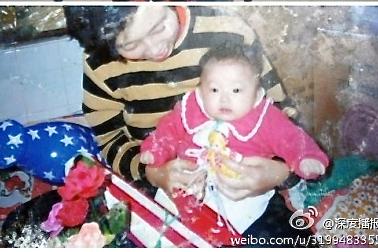While overseas Chinese are discussing Jung Chang’s recently published book, Mao – The Unknown Story, many average mainland Chinese still hang Mao’s portrait in their room to express their dissatisfaction about the huge wealth gap in China — caused by over 20 years of one-sided economic reform. Many foreign tourists are also surprised to see Mao’s image sold as a souvenir on the streets of Beijing, or his picture hanging from the mirror of a Taxi for spiritual protection.
Why is this tyrant, a truly evil being, who was responsible for mass murders on a national scale similar to, or greater than, those committed by Adolf Hitler and Joseph Stalin, as described in Chang’s book, still respected by the people who suffered at his hands not long ago?
One can not help but sigh at how deceptive the communist regime’s meticulous propaganda machine is! Living inside a black box, the Chinese people’s existence is truly pitiful.
However, with ever more holes pierced in the black box, how long can Mao’s evil spirit still rule China?
Subtle Signs
The latest issue of Hong Kong’s Chengming Magazine (see note) reported that on September 9, the thirtieth anniversary of Mao’s death, the regime did not hold any memorial activities as expected.
Initially, a commemorative conference for 200 people was planned inside the Central Party School, but was cancelled in late August. The reason given was there was “not enough time to prepare.”
In Mao’s home town, Changsha City, Hunan Province, a commemorative forum for 3,000 attendees was supposed to be held with key speakers such as Mao’s former staff, guards and his family, but was canceled at the last minute on Sept. 4, without explanation.
Pressure for Change
Chengming also disclosed that heated debates occurred inside the communist regime when many powerful Party members, who served with China’s leader Deng Xiaoping (1976-1989), such as Wangli and Song Ping, urged the current leadership to re-evaluate Mao’s ideology. They suffered during Mao’s rule (who did not?), and they want to see the re-evaluation happen before they die.
Furthermore, renowned mainland scholars such as Beijing University Political Science Professor Lei Jieqiong and Member of the Chinese Academy of Engineering Qian Zhengyang, also pressed the current leadership that “Mao’s Philosophy of Struggle has overthrown moral values, confused right and wrong for over 30 years and still casts its shadow over the Party and society. Do we still want our future generations to suffer from its harm and pay the price? The new central leadership are obligated to clarify the truth.”
Walking the Tight-rope
Ironically, the communist regime always has difficulty making decisions on black and white issues. The more clear the issue is, the more difficult it is to make the decision.
In reply to the above demands, current communist leader Hu Jintao said, “Re-evaluation is necessary, but need to create a suitable environment.”
Hu’s answer should not come as a surprise to people familiar with communist politics.
On one side, over 20 years of economic reform has left China with an extremely corrupt government, which has lead to a volatile social environment. Group conflicts accounted for 241 incidents each day in 2005. The extremely polluted environment, as concluded by the World Bank, is costing China 8 percent to 12 percent of its $1.4 trillion GDP annually in direct damage.
Hu is walking a tight-rope now, readdressing Mao could very possibly lead to the people’s awakening to communism’s deceptive history, its past and current crimes, the truth of the Tiananmen Square Massacre, the truth of the persecution of Falun Gong, and the truth of the current economic development in China.
On the other side, Hu’s comrades such as Zeng Qinghong – the current Deputy President and Standing Member in the Politburo are watching him like a hawk. Hu cannot afford to make a mistake.
Although Hu and Zeng just worked together to strike a blow against the Party’s former leader Jiang Zemin and his faction by sacking Shanghai’s Party Chief Chen Liangyu, it does not guarantee that Zeng will not stab Hu in the back. Mao’s Philosophy of Struggle predicts well the relationship among communist comrades.
Hu wants to act cautiously, but there is not much time left for him. With the help of the Internet and independent media such as New Tang Dynasty TV and Sound of Hope radio, the “Quit the Communist Party” campaign launched by The Epoch Times has spread all over China.
Both media are using the Nine Commentaries on the Communist Party in their campaign, which is viewed by the regime as a prominent threat. Yet, the Party dares not launch a propaganda campaign to counteract it as in past campaigns, fearing that the propaganda will attract more people’s attention, and make more people aware of its nature and discard the Party.
Who Will Be King
Currently, Chinese people invent creative ways to promote the campaign, such as writing the “Quit the CCP” slogan on small denomination bank notes, to let the country’s economic development help spread the word. The Chinese people will shortly walk out of the black box. Until that time, even Hu will still want to hold onto Mao’s ideology to safeguard his power, but Chinese people will discard him along with Mao.
Will Hu be brave enough to be the next Sergeyevich Gorbachev, or will he quietly accept his fate as the last king of the falling red dragon? We will see in the near future.
Note: Zhengming ( Chengming ) is a political commentary magazine based in Hong Kong. It frequently reports insider news from Beijing and is famous for its contacts within the Party. In the current Chinese political environment, the media inside China is strictly controlled. In order to gain an advantage or redirect a political situation, different factions inside the communist regime often intentionally leak secrets to ensure its publication in overseas media.



